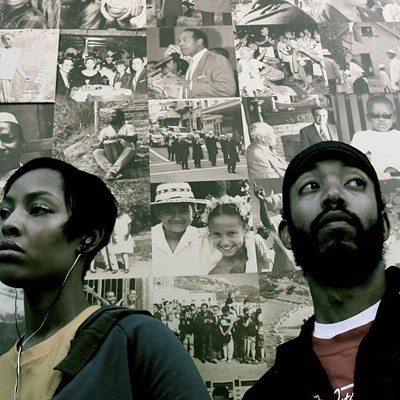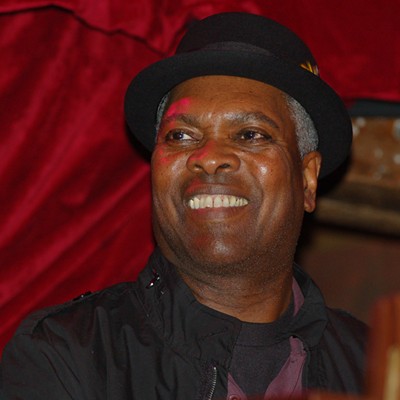On the dusty surface, Gilmore seems as down-to-earth and American as hot dogs, apple pie and Chevrolet. But peeling back the layers of mysticism, spirituality and philosophical meaning inherent in his gut-wrenching choice of song material reveals a much more complex individual than meets the eye. A man with a true poetic nature, Gilmore can discuss philosophy, religion and psychology, reflect on his own spiritual quests, and cite his eclectic choice in musical influences intelligently and passionately at any given moment.
His mixture of Eastern mysticism and Western tenacity reverberates in the lyrics accompanying his friendly blend of traditional country, folk, blues and rock styles. Like his musical influences -- which range from Buddy Holly, the Beatles and Bob Dylan to Townes Van Zandt, Jesse Winchester and Dave Van Ronk, to Hank Williams, Elvis and Webb Pierce -- Gilmore has the uncanny ability to transform sadness into beauty.
On his first album in four years, One Endless Night, recently released on his own Rounder-distributed Windcharger Music imprint, Gilmore's sweet, nasal-inflected tenor takes center stage where it belongs. His sixth solo album, recorded in Nashville with his newfound kindred spirit, producer-guitarist extraordinaire Buddy Miller, is a magnificent collection of mostly covers, including Butch Hancock's "Ramblin' Man," the Grateful Dead's "Ripple," and Bertolt Brecht and Kurt Weill's "Mack The Knife."
Of the hundreds of Jerry Garcia-Robert Hunter compositions to choose from, Gilmore has a special affinity for "Ripple." "I'm a Grateful Dead fan of long standing," he says. "I used to hear them at the Fillmore in the '60s, but there was something about this song the first time I heard it that I thought, 'Wow, that sounds like one of my songs.' It has this feeling of familiarity that I couldn't ignore."
It was folk-blues legend Van Ronk, not Bobby Darin, who inspired him to record his haunting version of "Mack The Knife." "I've always loved that song," Gilmore admits. "I loved Bobby Darin's version of it. I was a kid when Darin's version was a big hit, but in Dave Van Ronk's liner notes he explained the history of the 'Three Penny Opera' -- about it being a very anti-Nazi, anti-fascist statement. This put a whole new slant on it for me -- a whole new meaning and feeling to it. It's such a beautiful, simple melody, and so hypnotic." He also covers tunes by John Hiatt, Van Zandt, Winchester and others. An all-star cast of guest musicians includes Emmylou Harris, Jim Lauderdale, Julie Miller, Victoria Williams and Cry Cry Cry.
Gilmore is often asked why he recorded so many covers on the album when he's such a poignant songwriter himself. "A lot of people think of me mainly as a songwriter," Gilmore says. "But I myself have never particularly considered myself one. I know I've written a few really good songs, but in my own self-image, I see myself more as a stylist, as an interpreter, and it's always been that way. I didn't choose (the covers) with any theme in mind, other than that they're songs I particularly love."
Recorded in only five days in Miller's cozy living-room studio, each song boasts a homey, intimate charm that Gilmore considers closest to his heart. "There's something about the album that seems to me to mesh the various strings that are in my background," he says. "It never was accurate to classify me purely as a country singer. It's accurate in one sense, that country is definitely in my background, but equally so is that I was brought up on rock 'n' roll, folk and particularly blues music. Many people, because of the sound of my voice, assume that I'm purely a country-and-western singer, and that's all. I understand that because I do have this Texas accent and nasal quality in my voice, but in the actual makeup of my taste, and the music that I love, there's a blend of all those styles. I feel like this record on virtually every song has elements of all my influences."
Trying to pigeonhole Gilmore's unique sound into a singular category as an alterna-country star is futile. "That's always been a doubled-edged sword for me," he explains, "because my music appeals to a lot of different people. It has a lot of wide-ranging tastes, but it also makes it difficult to describe to people who haven't heard me." With his astute choice of cover tunes, Gilmore enables the songwriters' lyrics and storytelling paths to reflect his own emotional life cycle, spiritual reflection and quest for inner peace. He also lends much of the credit to Miller and his artful choice in session musicians. "There was a combination of truly good musicians and equipment, yet in a setting that was totally comfortable -- like being at home," he fondly recalls. "There was a sense of friendship amongst musicians even though some of them I had never met before."
Despite the lack of original material (he penned only three of 13 tracks, including the barnstorming rockabilly-styled "hidden" cut, "DFW"), with his lonely quivering vocal presence, Gilmore belts out each song as though he wrote it from personal experience. "Well, that's the way it seems to me," he agrees. "There's songs on the album that fit so well with my own feelings. That's the only way that I choose a song. If it produces a strong feeling in me then it makes me convey that same feeling to other people. I don't go through a long, thought-out process about choosing songs. I just have to be in love with a song. I could do 10 more records like this one of songs that I love." He describes the collection as a musical self-portrait, an artistic mosaic of the various influences that have shaped his unforgettable, tremulous tenor into what's become the trademark Gilmore sound. He retains an unexplainable, almost ghostly delicateness, enunciating every syllable he sings to dust-covered perfection.
His warbling, plaintive voice sounds remarkably like a hippie-friendly version of his hero, Willie Nelson. And like Nelson, Gilmore is a cosmic cowboy in the grips of midlife soul searching.
Though his singing style is similar to Nelson's, it's strictly unintentional. "That's an accident," Gilmore explains. "I had pretty much already developed my singing style before I had ever heard Willie." There is, however, an unmistakable kinship Gilmore admits that bonds these two great Texas musicians. "I think Willie Nelson is one of the most creative musicians that's come along in American popular music," he offers. "He blazed trails that no one else ever had. Even as a country musician there was so much jazz influence in Willie. He wrote songs that were very, very clever and literate in an odd kind of way, yet he still stayed within the medium of being simple and easy to understand."
After relocating to Austin, and rejuvenating his career in the late '80s, Gilmore has come to symbolize the current Austin music milieu -- its roots-oriented gumbo of country, rock, folk, Cajun, blues and Tex-Mex -- the way Nelson once ruled as leader of the city's outlaw country movement in the '70s. Gilmore now lives 20 miles outside Austin in the suburb of Spicewood -- just three miles from Nelson's sprawling estate. Now how's that for Zen-like musical karma. "I see him fairly often," Gilmore says matter-of-factly. "We have a whole lot of friends in common."
GILMORE KICKED OFF his latest U.S. tour in Seattle on May 6, his birthday. Born in 1945 in Tulia, Texas, and named after the "Singing Brakeman," country yodel king Jimmie Rodgers, he's been enamored with playing music since a young age. His father played guitar in a country band before moving the family to Lubbock, a Panhandle town with a colorful history of generating great musicians (Buddy Holly, Waylon Jennings, Terry Allen and childhood friends Hancock and Joe Ely). Gilmore graduated to guitar as a teenager, after first learning fiddle and trombone.
Holly's father financed his first demo recordings in 1965. A developing songwriter, Gilmore formed his first band, the T. Nickel House Band, with Ely on bass, and followed it with the Hub City Movers. Ely introduced him to one of his biggest influences, Townes Van Zandt, whose peerless melding of folk and country music struck Gilmore as a revelation. But it was Allen who first encouraged him to write his own songs.
Since reigning as the high and lonesome lead singer of the much revered early '70s Texas cult group, the acoustic-rooted Flatlanders (also featuring Hancock and Ely), Gilmore has been hailed as a genuine legend in the Lone Star state. Shortly after recording More a Legend than a Band, a limited eight-track release on a relatively unknown record label in Nashville in 1972, the Flatlanders disbanded (Rounder reissued the CD in 1991). Ely pursued a rock 'n' roll career (supporting the Clash on their first American tour), Hancock continued to write and record countless songs, and Gilmore moved to Colorado to study Eastern philosophy and metaphysics. He didn't perform music publicly for more than a decade.
"I didn't actually abandon playing music," he says quietly. "I just abandoned the business side of it. I still played a whole lot during that period." His pure love of singing and playing drew him back to the cutthroat corporate music world. "The time came around when I realized that it was my calling," he says. "It was both the only thing I knew how to do, and the only thing I wanted to do," he chuckles. "It became a pretty easy choice when I finally saw it in that light."
Last year the ground-breaking Flatlanders, who played a mixture of folk, string-band country and Delta blues, reunited for a series of scattered gigs, and have since been sporadically collaborating on new material. "Well," he says, hedging slightly before clarifying, "we've been writing a lot of stuff together which is very strange because the fact is, we had never done that before. We played together and we traded songs and we learned each other's songs, but this is the first time Butch, Joe and myself actually sat down and wrote songs together. And we found out that we could do it, we were good at it, and that we enjoyed it. It's almost like a whole new beginning for us." A new Flatlanders record is on the horizon, but Gilmore is uncertain of its release. "We don't have a record deal although we've been offered some," he declares. "When the right one comes along we will probably take it, but there is no specific plan in place."
Since his musical reawakening in 1988 with the critically acclaimed solo debut Fair and Square, Gilmore has also been lauded as a pioneer in the development of the now thriving insurgent country scene synonymous with Austin. It's a rustic and welcome alternative to the glitzy, country pop pabulum spewing forth from Nashville these days. Astonishingly, he didn't release that first solo effort until 16 years after the Flatlanders' overlooked debut.
So if you like your country music sad and lonesome in the way old-time honky-tonk singers Hank Williams and Lefty Frizzell perfected it, Jimmie Dale Gilmore won't disappoint. The concert that almost wasn't is sure to be a smashing success. And hey, Johnny Winter -- no hard feelings, partner.
Jimmie Dale Gilmore performs at 7:30 p.m. Tuesday, May 16, at the El Casino Ballrooom, 437 E. 26th St. Tickets are available for $12, $10 for KXCI members, at Hear's Music and the KXCI offices, 220 S. Fourth Ave. All proceeds benefit the community radio station. For information, call 623-1000.










